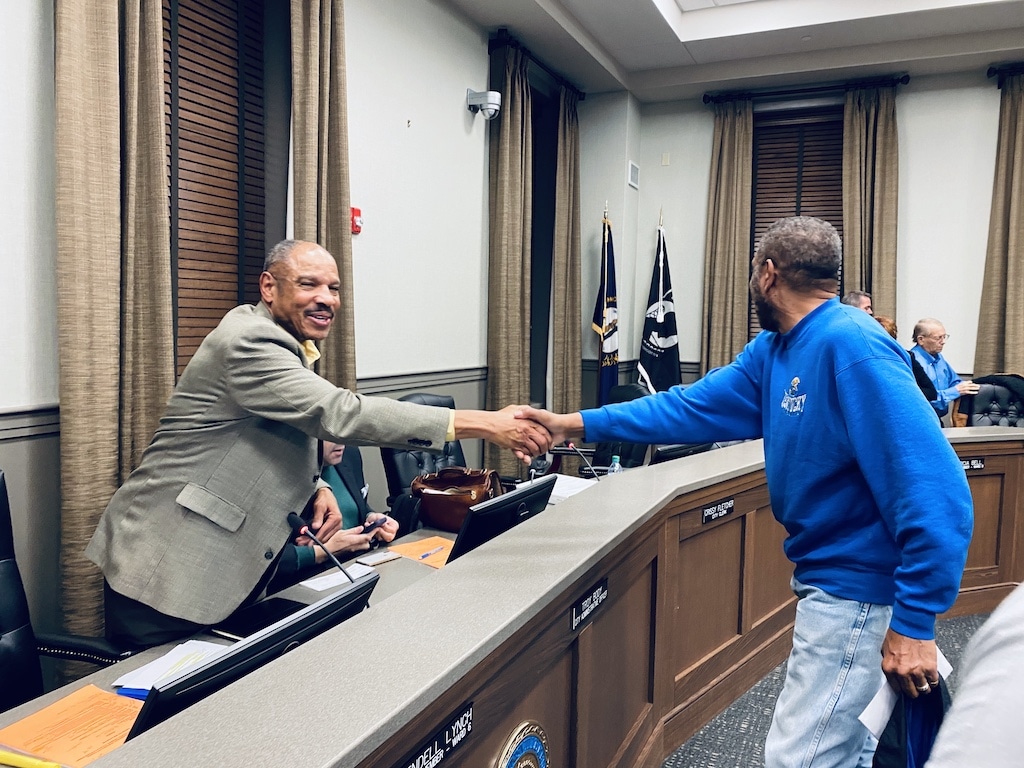Ward 6 Councilman Wendell Lynch, a retired banker and lifelong Hopkinsville resident, will become the city’s interim mayor.

Hopkinsville City Council agreed Tuesday night to vote at its next regular meeting, on Feb. 18, on an ordinance naming him mayor, effective March 1.
“I do not take this responsibility lightly,” Lynch said.
The decision came in a 10-0 vote following a motion by Councilman Terry Parker. Lynch abstained, and Councilman Don Ahart, who recently announced health problems will prevent him from running for re-election, was absent.
Lynch’s interim appointment is through the end of this year. Then, two more years will remain in the unexpired term of Carter Hendricks, who left the office last week to become executive director of the South Western Kentucky Economic Development Council.
A special election this November will determine who serves in the mayor’s office in 2021 and 2022. The local parties will nominate the Democratic and Republican candidates for the special election.
After Tuesday’s council meeting, Lynch said he didn’t agree to be interim mayor with an aim to launch a political career. But he wasn’t ready to rule out the possibility of running in the November special election.
“That’s a decision I will make in time,” he told Hoptown Chronicle. “That’s the only way I can answer that. Right now I need to get my arms around what’s before me.”
Finance Decisions Ahead
The vote to make Lynch interim mayor was pushed to the next meeting because, in part, he wants to finish work he started as chairman of the Pension/Future Funding Committee.
“Our committee brought forth the recommendations that the council as a whole has been working through, and we’re trying to find where we’re going to land on that,” he said.
The recommendations include a combination of tax increases and cuts to help offset an estimated $66 million in state-mandated pension payments over the next 10 years.
Lynch wants the ability to act as a council member on those financial decisions for a few more weeks. As mayor, he won’t be able to vote on those matters (unless there is tie on the council).
“We’ve got huge gaps starting next fiscal year and it gets bigger every year,” Lynch said. “There’s no secret about that. How we close and bridge that gap … we have to come to a decision. The committee’s recommendations can do that, but it does have some heavy-weight changes in there that some people are not as comfortable with as others.”
History in the Appointment
Lynch will become the first African-American to serve an extended period in the Hopkinsville mayor’s office. That is noteworthy in a city that ranks as one of the most racially diverse communities in the state. About 30 percent of the city’s residents are black.
Several members of Lynch’s family — including his wife, Bonnie, a retired teacher, and his brother, Arnold, a retired Christian District Court judge — attended Tuesday’s council meeting.
Lynch said family has been on his mind recently as he thinks about the significance of his appointment to the mayor’s post. His parents were J.T. and Virginia Lynch.
Recently, Lynch found an ancestor’s grave he’d been seeking for some time in Stewart County, Tennessee. It was the grave of his great-great-grandmother, Sally Blane, who had been born a slave in Virginia in 1827. She was sold and taken from Virginia when he was 6 years old. She died in 1905.
“I stopped and thought about it then when I was standing by her headstone,” Lynch said.
“I thought about how far our people have come,” he said. “When I say our people, I mean everybody because we couldn’t have come this far unless everyone pitched in. I reflect on that a lot.”
Hopkinsville has had one other black mayor, but his term was brief and ended in controversy.
The late F.E. Whitney is listed in the city’s records as having served as mayor for one week in May 1972. He was mayor pro tem at that time and had been on the city council since 1953 — longer than any other council member at that time.
A real estate agent and tax preparer, Whitney wanted to be considered for an appointment to the mayor’s office when a vacancy arose. But few council members at that time would consider Whitney for the post, and businessman George L. Atkins was appointed instead.
Many years later, Whitney described his disappointment in interviews with Jack Glazier, an anthropology professor at Oberlin College and author of “Been Coming Through Some Hard Times: Race, History and Memory in Western Kentucky.”
Whitney said he felt it was his race alone that disqualified him in the eyes of most council members. They voted 10-2 for Atkins.
After the Atkins’ appointment, Whitney served out the remainder of his council term and did not seek re-election. In 1977, he was elected to Christian Fiscal Court and served as a county magistrate for 20 years.
Jennifer P. Brown is co-founder, publisher and editor of Hoptown Chronicle. You can reach her at editor@hoptownchronicle.org. Brown was a reporter and editor at the Kentucky New Era, where she worked for 30 years. She is a co-chair of the national advisory board to the Institute for Rural Journalism and Community Issues, governing board past president for the Kentucky Historical Society, and co-founder of the Kentucky Open Government Coalition. She serves on the Hopkinsville History Foundation's board.




